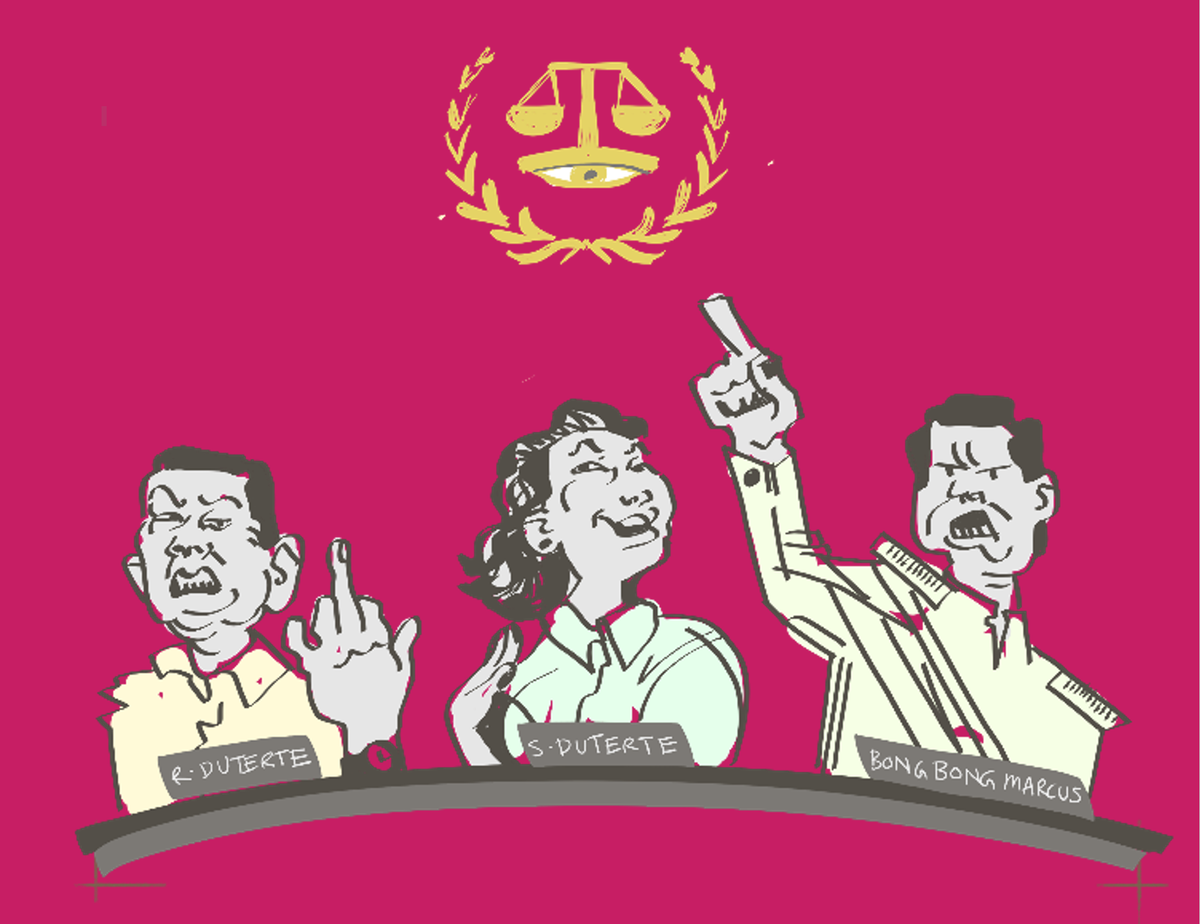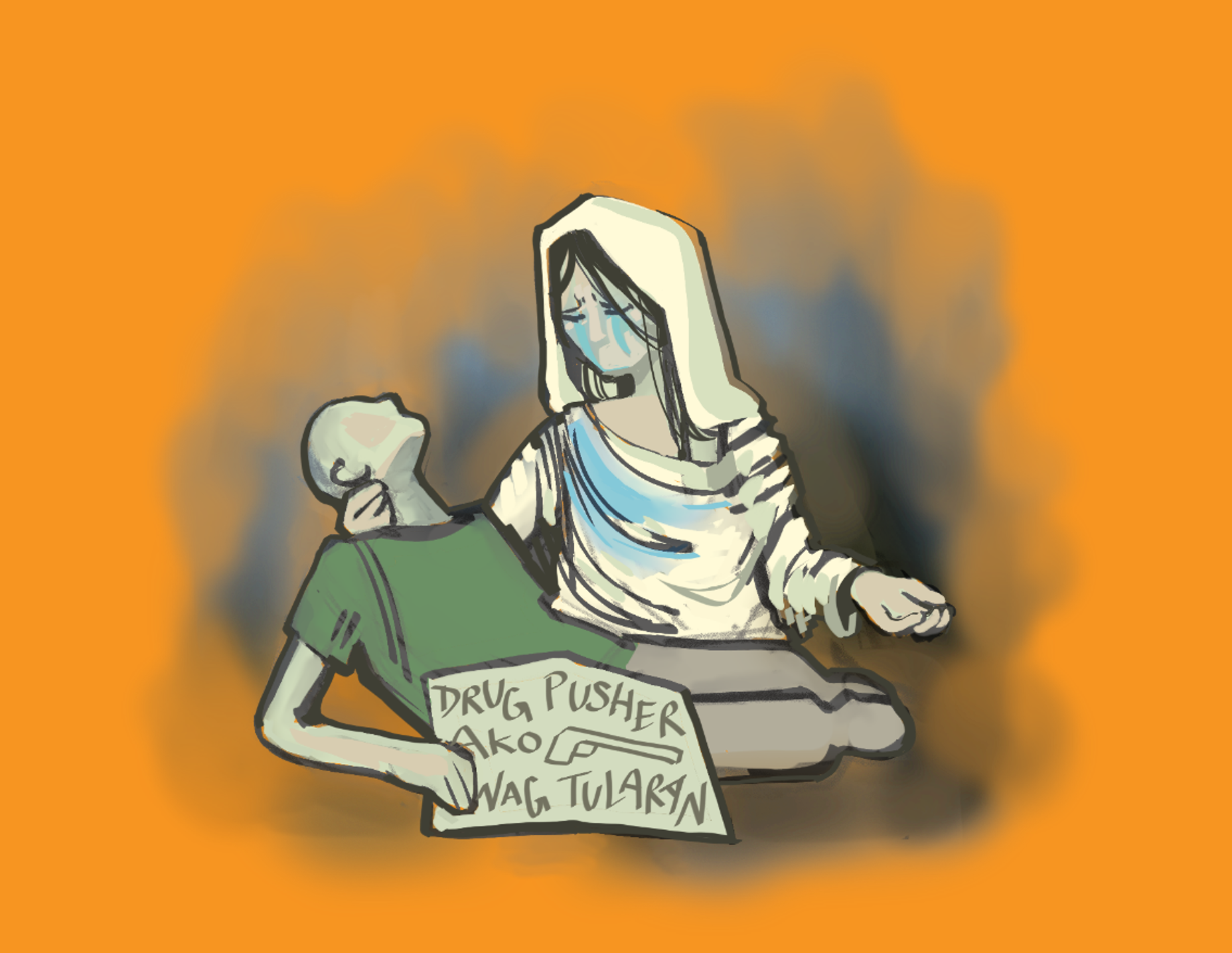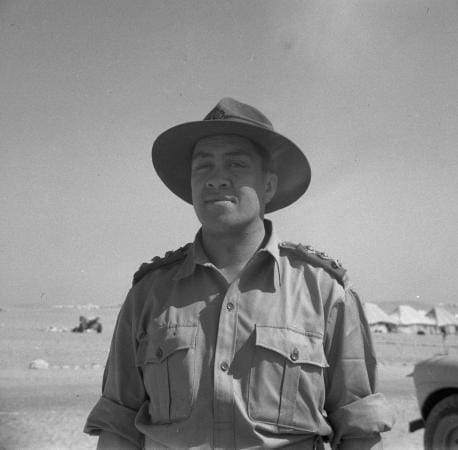The Fall of House Duterte: From Hero to Hitler
The “Game of Thrones” backstory behind the high-profile arrest of the Philippines’ Rodrigo Duterte

Drugs, Deaths and Deals that brought the Philippine “Punisher” to heel
Rodrigo Duterte was elected President of the Philippines to crush its drug menace with fire and blood. The carnage that followed had earned House Duterte the glory and infamy. But when it tried to linger in the ambrosial corridors of power, it found itself on a collision course with the guileful House Marcos. The unbowed House Duterte faces ruin, but the clash was proved to be their undoing.
“A warrant of arrest? You will just have to kill me if I refuse,” said the defiant Duterte, standing on the cabin’s aisle of Cathay Pacific (CPA907) from Hong Kong, which landed moments ago. Outside, a phalanx of guards was stationed within Manila Airport’s Terminal 3, facilitating the arrest. At a distance, his supporters chanted his name. Duterte and his entourage were carted off to the nearby Villamor Airbase, handing the Ex-president to the Interpol hours later. Duterte boarded a Gulfstream G550 (RP-C5219) bound for Rotterdam, Netherlands.
On 14 March 2025, Duterte first appeared before the three judges of the ICC (International Criminal Court). Rodrigo Roa Duterte, former President of the Philippines, became the first Asian head of state to be tried by a global tribunal. Known as the “Trump of Asia” and for his “war on drugs,” barely three years out from office, he ended up incarcerated in a Dutch prison facility in Scheveningen for alleged crimes against humanity.
From President to prisoner, Duterte’s arrest on 11 March 2025 marks the precipitous death knell to a sadistic regime. On the surface, this is a milestone in the rules-based international order; another doddering tyrant is brought to account. At closer inspection, Duterte’s dramatic downfall, from glory to infamy, is the culmination of the political rivalry between two warring Filipino dynasties. House Duterte misjudged the ruthless cunning of House Marcos. The blunder would cost the former its patriarch and future. Duterte is fated to rot in The Hague, leaving House Marcos unopposed, feasting on the spoils of war.
Modern New Zealand politics pales compared to the Pearl of the Orient Seas. In the Philippines, democracy is a blood sport. While Aotearoa dwells in the developed realm of House of Cards, Philippine politics is the spitting medieval world of Game of Thrones. One with spectacular betrayals and ever-changing loyalties, there will be blood. This story is the stuff of Netflix. But what I can say for certain is this is not a movie.
When the dust settles and memoirs are published, historical annals will likely say more. From the sidelines, I recount this Dance of the Dragons through Dutertismo’s gaping Heart of Darkness.
“My God, I hate drugs… I have to kill people because I hate drugs.”
Rodrigo Duterte won the 2016 presidential race, vowing to quash the narcotics trade by hook or by crook. Then incumbent, House Duterte, is the fiery and splenetic spawn of the Southern Philippines known for their fury and vulgar rhetoric. Davao City was its turf, where the technique of extrajudicial killing (EJK) was perfected to a tee. Davao Death Squad (DDS) was his personal militia. The arrangement was simple: the more drug suspects killed, the higher the reward. This was known as the “Davao Model.” One DDS hitman admitted receiving a ≈$2000 monthly stipend on top of the blood money. Duterte had a literal Death Note of people he deemed linked to drugs. His critics were silenced and jailed on fabricated charges. If the foul-mouthed macho Mayor willed it, it shall be done.
Indeed, the anti-drug crusade was waged in earnest: “Davao Model” writ large. Project Double Barrel, widely known as Oplan Tokhang, had instructed the police for a nationwide “neutralization” of illegal drug personalities. Signed by Duterte’s long-time lieutenant, it was proof of the State’s directive against the civilian population. The imagery was all too vivid for me; I was in Manila during this unholy war. But, as the prevalent syllogism goes, “If you’re not a drug addict, why worry?”
Drug suspects were abducted and summarily executed on the sly. They were dumped in the streets for onlookers to see: limbs hogtied, heads duct-taped, visibly tortured, bearing a scribbled cardboard sign: “Adik ako, wag tularan (I’m an addict, don’t imitate).”
On average, 34 people were murdered daily. By the end of January 2017, the Philippine National Police (PNP) revealed that there were at least 7,025 casualties related to this ferocious campaign against illegal drugs. Children were not spared; the youngest victim is age three. At the end of Duterte’s term in June 2022, the death toll was estimated to be 30,000. There are disagreements with the actual numbers, but the mass liquidation was hard to dismiss. It was Duterte’s official raison d’être; otherwise, he would not have been President to begin with. In 2016, he promised a bloodbath and a butchery there was. Duterte was elected by 16 million with a resounding mandate to implement his murderous vision.
Duterte supposedly purged the streets of durogista (drug users) at the cost of human rights. Nonetheless, it garnered Duterte popular support, peaking in 2020 with a 91% approval rating. Tyranny of the majority? For some, he is the bold anti-hero, “the Punisher,” who would cure our national maladies of drugs and corruption with the necessary iron fist. Why? Because Filipinos had supposedly turned recalcitrant from the law in decades of “frail” democracy. Drug cartels purportedly sprouted like weeds. We somewhat forgot to “fear” in the peacetime lull. Duterte barged in, banging the bedroom doors like a strict father to a wayward child. Wake up! We needed to be disciplined for our own good: sparing the rod would spoil the child. Duterte urged his audience to kill drug addicts because it’s painful for the parents to do it themselves. He’s no father figure.
Duterte, in his household, is a violent man—a womanising wife-beater. His marriage with his first wife, Elizabeth Zimmerman, was dissolved. According to her, their relationship was “miserable and unhappy,” adding to Duterte’s volatile temper. A court-ordered psychiatric report substantiates her claims. It found Duterte as a “highly impulsive individual” who suffers from a long-term “antisocial, narcissistic personality disorder” with behavioural patterns that resembled “insensitive self-centredness, grandiose self-entitlement, manipulative behaviours, a tendency to violate rights of others” and general lack of empathy. The diagnosis suggests that Duterte is a psychopath.
Why did Duterte hate drugs? According to a leaked diplomatic cable from the US Embassy-Manila, a close friend of Duterte revealed that one of his two sons is a drug addict. Duterte channelled his rage from failing as a father towards drug users, leading him to adopt vigilantism. Unbeknownst to Duterte, his daughter was also abusing drugs. Recently, after the arrest, her dump account was leaked online, unveiling a diary of her “wake-and-bake” habits, the goodshit kush she publicly blazed in Pampanga, and the way she gloats about the “high” life when her father ordered pogrom over the great unwashed.
Perhaps the most revolting hypocrisy in this whole scenario is that the anti-drug caudillo himself is a drug user: cannabis and fentanyl. Of the thousands slain for mere drug use, House Duterte forgot to glance in a mirror. They were addict-hating addicts. I would be remiss not to mention that the Führer was a junkie. Is that how a mass murderer copes? Duterte was also accused of involvement in Davao’s illegal drug trade. The narco-war was a façade to establish a state-wide drug syndicate. Seven hells! The Lord “Punisher” is a drug lord himself?! The rapacious hobgoblins had struck gold: coins be their opium. With this, House Duterte’s mortal sin of greed would lead to their rancorous row with House Marcos.
“If I get killed, kill Marcos… No joke. No joke.”
Duterte’s downfall was the crest of his bitter rivalry with his vulpine successor, Ferdinand Marcos Jr., the current President, with whom Rodrigo’s daughter, Sara Duterte, chose to ally in the 2022 elections. House Marcos is the figurative “King in the North,” with fervent political support in Northern Philippines, but hounded by the spectre of human rights violations from their oppressive Martial Law past. In the 2016 elections, Duterte swore to authorise the divisive burial of House Marcos’s late patriarch to a national hero’s grave, which he did: a gesture House Marcos paid with their endorsement and loyalists’ votes. An entente cordiale was formed.
In the 2022 elections, to secure success, House Marcos forged a formidable but fragile alliance with House Duterte, which has a draconic grip over their fiefdom down South. Duterte disapproved of their coalition because he had his own lackey groomed as Sara’s tandem. But Sara is a headstrong woman with goals of her own. Duterte’s pick has a smattering of supporters compared to Sara’s chosen consort. She spurned the arranged wedding and eloped with Marcos regardless. And thus, the two powerful dynasties fused in wedlock. Marcos’s sister described it as a “marriage made in heaven.” Combining their voter bases resulted in their landslide victories.
This is A Song of Ice and Fire: uniting Westeros for a higher call. But the steps to the Iron Throne were barbed with treacherous blades as avarice kicked in. Ice and Fire were simply not meant to be; they annihilate each other upon contact.
After his inauguration, Marcos started to deviate from Duterte’s brand of leadership. He reversed significant Duterte policies, including his strategy in anti-narcotics enforcement. One thing that I avoided for the sake of amity but risked censoring a crucial pinch point was the Philippines’ foreign relations with China, the South China Sea dispute in particular. It was no secret that Duterte favoured the pro-China approach, even swearing he would never set foot in the US, our traditional security ally. In his 2016 State visit to Beijing, Duterte declared that “China, Philippines, and Russia… three of us against the world.” He went as far as his treasonous jest to make the Philippines a “province of China” in front of the giggling Chinese ambassador. Xi Jinping was delightfully touched. Duterte is a chink in Uncle Sam’s first-island-chain armour.
Marcos, initially, was pliant to a pro-China stance and treated Xi Jinping as a regional partner. However, shortly after his three-day Beijing tour (January 2023), Marcos pivoted his foreign policy back to the Americans. Xi Jinping rejected Marcos’s proposal to drill for natural gas in the troubled waters of the South China Sea. The Philippines’ major energy reserves are expected to dry up in 2027. It would ravage our economy. Unlike Duterte’s negotiations with Beijing six years prior, Marcos returned from China empty-handed. But Marcos will not be denied. After all, this was his redemption arc: a time to prove House Marcos had the skills to govern, not just the glorified toff they were. When Marcos negated Duterte’s diplomatic legacy, it was a slap in the face. House Duterte gears for war as bitter divorce ensues.
The Marcos-Duterte grand alliance of expediency spotted its early cracks. Marcos denied Sara control over the military (Defense), handing her the intricate and tedious Education department instead. This was apparently a test and a trap. Sara is the Vice-President, one heartbeat away from the throne. Marcos was said to have been forewarned about Sara’s ambition to oust him. In a Balesin Island jamboree in November 2021, Sara confided to some guests that she agreed to be Marcos’s deputy since he might “die or get into an accident” before his term ends. Marcos was counselled not to grant Sara her legions.
Although this was not public knowledge, I suspect the informer was an ex-Duterte ally inside the security cluster. This was bolstered by Sara’s confirmation that she had never been invited to any intelligence meetings. Marcos was likely informed about Sara’s involvement in illegal drugs and the death squads. Filipino presidents, once elected, are only allowed a six-year single term. Unseating Marcos, mid-tenure, would open a one-decade incumbency for Sara to grasp. But Marcos was several moves ahead of their gambit since the opening.
Education bureau was proved to be a poisoned chalice. Sara was criticised for rudderless management, failing to improve the dismal conditions of Filipino learners, assessed to be worse than our developing neighbours. Then came the “confidential funds” that Sara had royally mishandled, suggesting corruption had occurred. Sara thought a copious public allowance was the reward, a bridal dowry, for her union with Marcos, who should give her the suns and stars as her pound of flesh. But it seems House Marcos had intuited that House Duterte was hoarding a war chest, from the loot, for its very demise. Golds beget Goons that beget Guns. One can’t be too cautious. The patrician House Marcos will not bend its knees to the parvenu, House Duterte. And thus, Marcos stood watch as Sara, green with greed, was picked to the bone.
When efforts had failed to elicit from Sara a truthful answer—where did all the money go?—a fact-finding committee was launched. Receipts on which the funds were disbursed were signed by junk foods. The fiasco has thrown Sara into the pit of mockery. Her foolish faux pas became a national laughingstock. Sara is unamused with the punchline of her own making. She resigned from her Education post in June 2024. But she didn’t resign, expecting accountability to die down, did she? Apparently so. Marcos’s congressional vassals further cranked up the investigative heat.
November 2024, in a pre-dawn video conference with her team of propagandists, a fuming Sara Duterte roared, “Putang-ina ninyong lahat! (Sons of bitches, you all are!)”. Her coarse tirades pertain to a trinity of her arch-nemeses: President Marcos, the First Lady, and the Speaker of the House (all from House Marcos). One month before, Sara admitted that she fantasised about beheading Marcos after their relationship went “toxic.” She would later disclose hiring an assassin to murder the three. “Wag kang tumigil ha, hangga’t di mo mapatay sila (Don’t stop until you kill them),” she candidly confessed in a dimly lit room inside the Parliament’s compound. This was House Duterte’s declaration of war against House Marcos and the Speaker’s Parliamentary dominion.
That night, Sara Duterte reportedly planned to stage an assassination attempt on herself inside the Legislative grounds to “court public sympathy” and stoke a revolution from a wrathful mob. It was thwarted when her suspicious “walking exercise” request was rebuffed.
Sara’s public meltdown was the crescendo of a months-long feud between Houses Duterte and Marcos. Knowing she’s in line to succeed her target, the veep’s confessions are not a threat House Marcos and its vassalage had taken lightly. Palace security was on red alert, identifying potential cut-throats. Rumours to expel her from office spread as early as 2023, but this time, it was the logical conclusion. The Philippine impeachment process mimics that of the US: the Congress impeaches while the Senate convicts. Only in February 2025 did Congress finally impeach Sara with prayers for her removal and a lifetime ban from occupying public office. Seven articles of impeachment assailed her seditious conduct, criminal collusion (drugs & EJK) and corruption. With the Senate on the President’s sway, Sara had no more moves left. She fell to a familiar checkmating pattern, likely to die on this hill.
Duterte, meanwhile, showed that, even in retirement, he’s a devious fox. When Sara went mano-a-mano with the Parliament over her budget woes, Duterte came to the rescue. Coming out of the 2022 elections, Duterte’s party of PDP-Laban had gathered a sizeable army of solons; it was the dominant party then, in fact. Earlier, he plotted to install his collaborators to the Speakership, blackmailing Marcos of impeachment from thereon. This is to ensure that the Parliament’s “power of the purse” is at their beck and call. But alas! There’s a snitch. Marcos’s cousin, the current Speaker of the House, is the Night’s Watch of coups. When he learned of Duterte’s conspirators in May 2023, he stripped them of their daggers—demoting them to the lower rungs. They tried again in late 2023, but this time, Duterte’s bannermen charged uncloaked. House Marcos raided PDP-Laban, bleeding it of its members and absorbing the deserters into the Marcosian faction. The macho Duterte was hobbled and emasculated.
Desperation drove Duterte to raise hell. Greed had pervaded his system. Draining him from his precious power is like an opioid withdrawal. He would rather see this country burn if he could be the king of the ashes.
In late 2023, there were rumours of military grumblings that challenged the rule of Marcos. House Duterte craves the intoxicating nectar of power, which House Marcos had coveted for so long after their own unceremonious exile in Hawaii almost 40 years ago. In 1986, the ruling House Marcos was toppled in a popular revolution, ending its two-decade reign. Now President Marcos, “the prince that was promised,” had longed to regain the Red Keep after his father, the Mad King, was dethroned. He would not share the palace fortunes, his tropical “birthright,” least of all with a bilious man who rebuked his government. Duterte called Marcos a “drug addict” who should have been wrapped in a body bag during Tokhang. One of Duterte’s sons even proposed pulverising Marcos’s home province of Ilocos Norte into dust should they return to power. He even alluded to the doomed tsarist House of Romanov, massacred by the Bolsheviks, as House Marcos’s eventual comeuppance. House Duterte crossed the Rubicon.
Duterte wanted Sara to replace Marcos pronto. House Duterte fomented destabilisation to agitate the masses while it surreptitiously recruited the military for its coup d’état. Chaos is a ladder. Duterte admits chatting with retired soldiers but denies hand in hatching a putsch. However, Marcos’s top commander revealed that “a group of retired military officers” were coaxing active military personnel to overthrow Marcos and declare their allegiance to his constitutional heir, Sara. Given Duterte’s penchant for violence, House Marcos recognised this as an existential threat. Duterte wanted to incite an open rebellion which would plunge the country into a civil war. Marcos resolved to lop the head of the allegorical snake. This is where the ICC came in.
The ICC has been tailing Duterte since 2018 after he was repeatedly warned about his drug war. House Duterte’s top brass, including Sara, were all under ICC’s crosshairs. Duterte thought himself untouchable. He withdrew the Philippines from the ICC that year, hoping to evade scrutiny. But Marcos hung a thread of horsehair over Duterte’s head. His proverbial Sword of Damocles had just come into play.
Marcos said before that ICC envoys can only visit the Philippines as tourists. But in late 2023, Marcos quietly allowed the bloodhounds in, leading them to Duterte’s trail of gore, scaling every inch of his war on drugs. The surprising démarche was evident when Marcos’s allies suddenly called for the government’s cooperation with the ICC. But, publicly, Marcos maintained the ICC had lost its authority over the Philippines. In the months leading to Duterte’s arrest, the government announced that it would not hinder Interpol from serving the ICC warrant—priming the nation for the climactic battle royal.
“You have to kill me to bring me to The Hague.”
When Duterte heard about an impending ICC arrest, his knee-jerk reaction was to abscond to China. On 6 March, he scampered from Davao City Airport, under the cover of the night, via Philippine Airlines (PR 2829). Duterte’s henchman and Tokhang executioner-in-chief received intel on an ICC arrest warrant, presumably on 7 March. That day, Duterte boarded an early morning flight (CX 912) to Hong Kong. Duterte’s retinue comprises his partner and close advisers of generals and politicians. He was reminded how Marcos’s pawns had captured House Duterte’s slippery bishop, imprisoned for multiple sex crime charges. This was after Marcos had cleansed pro-Duterte constables from the rank and file of the Davao police division. Duterte is vulnerable, even in his own stamping ground.
Perhaps this was Duterte’s last hurrah: savouring his final gulps of freedom or a foot in the door to a life on the run. But in November 2024, Duterte was the same man who taunted the ICC to “hurry up” before he kicked the bucket. Yet, he still fled with an excuse to attend a Thanksgiving rally for Filipino expats.
March 11, a napping Marcos received the Interpol’s red notice at three in the morning, an ungodly hour. D-day had dawned before sunrise in Manila. Marcos had been preparing the arrest since January, named “Oplan Tugis (Pursuit).” At 6:30 AM (PHT), he quickly convened his small council. The few he trusted were the Interior and Defense secretaries and Marcos’s spy chief, who maintained cordial ties with Duterte. On 10 March, a day before the arrest, Marcos’s general unleashed his two battalions, a “7,000-strong force” report says, to await for Duterte. It was a decoy deliberately leaked to the press for a “psychological warfare” to spook Duterte from landing in his bailiwick of Davao. Police downplayed it as a simulation exercise (SimEx) as part of its larger ploy. The non-event had dissuaded Duterte from his Southern barony, leading him to Marcos’s trap, as we shall see shortly.
The “Master of Whisperers” had planted a mole inside Duterte’s close circle, shadowing them in Hong Kong. House Duterte was torn between two choices: to leave or stay. Hong Kong is an island in Southern China: could Duterte have chosen his own Napoleonic Elba? However, it was said that Xi Jinping, Duterte’s bosom friend, may not be too eager harbouring a renowned fugitive in his yard. An elite Hong Kong police squad was deployed to the hotel where Duterte had checked in. At his supporters’ rally in Southorn Stadium (March 9), Duterte shared that he was told by Hong Kong authorities to refrain from discussing politics. China is still an Interpol member. By sheltering Duterte, Beijing risks its working relationship with Interpol when it pursues its own Chinese fugitives abroad with the latter’s resources. Duterte sought sanctuary from the Dragon but was declined. House Duterte faces another dilemma.
In a three-day sojourn in Hong Kong, Duterte deliberated on his options, skedaddling or calling Marcos’s bluff. Supposedly, House Duterte was fed with reliable intel, but they couldn’t determine whether it was another Marcosian subterfuge. Marcos’s cordon sanitaire made it difficult for them to surmise if there was any arrest warrant at all. Their propagandists kept insisting it was all “fake news.” One of Duterte’s sons posted a message online, hinting at their doubts. Duterte’s lawyers advised him to head to the Chinese hills while the children reasoned otherwise. Self-exile is political hara-kiri. The spymaster’s little birds had crooned: Duterte’s children prevailed, and the rest is history. On 11 March, Duterte departed Hong Kong at exactly 7:45 AM (HKT/PHT). Destination: Manila.
Despite his gentle demeanour, Marcos is a calculating man. He was reared in the halls of power, the Palace protégé of his deposed autocratic father. He is a self-confessed Machiavellian. The “Marcos Restoration” in 2022 was the fruit of their long game after years as a global pariah. He aimed to redeem House Marcos from its inglorious despotic reputation by embracing democratic reformism. He stutters in extemporaneous talk, unlike his blathering but charismatic foe. But his feigned meekness is misleading, a foible that his macho opponent underestimated by magnitude. In the hour of reckoning, Marcos, dubbed by fans as the “Tiger of the North,” drew his feline claws. Duterte’s arrest was cold and methodical. ICC arrests often take years, if they occur at all, but Marcos seized the vengeful firebrand within a day. Converging political will and interest can do wonders for an able democrat.
On the morning of March 11, news of Duterte’s imminent arrest was abuzz. The earliest public scoop I could find was around 8:20 AM (PHT). At this time, Duterte is currently above the South China Sea, while the Manila Airport is swarming with cops. From the date ICC had issued its warrant, Duterte had been stalked by four Filipino agents in Hong Kong. They planned to arrest him there, but Hong Kong authorities refused to cooperate. Instead, Chinese police escorted Duterte to ensure that he would leave. Duterte’s closing attempt at self-preservation was through deception. He tried to conceal his movement by booking five flights in a row. But the ruse was in vain. By the time he had landed, they had met him at the tube and read him his rights.
“A warrant of arrest? You will just have to kill me if I refuse,” said the defiant Duterte, standing on the cabin’s aisle of Cathay Pacific aircraft. When he realised his fatal blunder, Marcos had backed him into a corner.
He was hauled off to the nearby Villamor Airbase. There was little fanfare, no perp-walk, virtually a media blackout. It was done to prevent mass outcry from his base. Even now, Duterte maintains a passionate following—a personality cult. He would have played the crowd like a fiddle if the pressmen were around. Early information mainly came from Duterte’s daughter, posting Instagram stories about the event. Once the affair was over, we learned more.
His moments of petty resistance came when they asked for his fingerprints, questioning the procedure’s legality. Duterte was given a moment to read his warrant of arrest; he then relented. All of these were recorded in police body cams. When the time came for Duterte to go, the room was flooded with a special police unit, all women, to flush Duterte out. His partner and daughter hurled profanity-laden invectives at the arresting officers, but the geriatric Duterte capitulated—accepting the hammer to fall.
At around 4 PM (PHT), Duterte’s minions tried to impede the arrest through the Supreme Court, but such is fait accompli. The appeal turned moot and academic before the Magistrates were even called into session. At 11 PM (PHT), Duterte was flown to Dubai with a five-hour layover. Word from the grapevine is that they pondered to escape and seek asylum at this juncture. But Duterte had a change of heart. A few minutes from touchdown to Rotterdam, a gloomy Duterte delivered his “Mi Ultimo Adios (My Last Farewell),” claiming he accepted his destiny. In his speech in Hong Kong, he wanted to be remembered like José Rizal—a Philippine national hero.
Marcos justified Duterte’s arrest, saying his duty was to uphold the rule of law. But in the past, he reiterated that ICC overtures will not be entertained, a striking volte-face. His explanation was the country’s commitment to the Interpol. The ICC retains residual jurisdiction over crimes committed before the withdrawal, and in years, the Philippines was a member (2011-2019), as indicated in the warrant. After Duterte was jetted off, Marcos privately told his small council: “There’s no reason to celebrate.” A memory came to the fore, a déjà vu, when they were whisked away to Guam by the Americans in 1986, beginning their exile some forty-odd years ago. But now, he had every reason to celebrate, for justice and politics at least. It was a carefully calibrated conquest; a great House was vanquished. And now the rains weep o’er his hall, and not a soul to hear—that garrulous Lord of Castamere.
On 14 March, Duterte appeared before the ICC. He was not Duterte cursing the Pope, bad-mouthing Obama, and blaspheming God. He’s no longer “the Punisher” that terrorised the streets of Davao. He answered the Judge’s question in a quavering voice like a kid about to get caned—machismo no more. He is naked with defeat; he is out of his element. The ICC French translator mispronounced his name, the dreaded “Du-ter-te” reduced to “Doo-turd.” How the mighty have fallen. Rodrigo Duterte, the sexist macho-fascist who told soldiers to shoot female rebels in their vaginas, claiming that without it they are “useless,” sat before three women Judges—holding his fate to the gavel. Poetic justice, indeed.
Sara followed her father to The Hague, and at the time of writing, she was still there, forming a defence team led by a British-Israeli Barrister. While Duterte languishes overseas, House Marcos besieges his remaining stronghold. When Sara returns, an impeachment trial and dozens of criminal charges await her. A senatorial election looms in May, the coda to this royal rumble. House Duterte is in tatters, worse for wear. Greed for guns, goons and gold was their hamartia. From allies to adversaries, their joust with House Marcos left a ruinous blow. They can strive to recover their status, but the vigilant and victorious House of Marcos will keep the gates guarded.
When the ICC renders its guilty verdict, the result will not be up for debate that Duterte fanatics can contend online. The blood-soaked reign of Rodrigo Roa Duterte will simply be a matter of fact. His name is numbered with the likes of Hitler. After all, Duterte compared his drug war to the Third Reich’s genocide against European Jews. He would be “happy to slaughter” drug addicts as the Nazis relished in their Holocaust. And lest we forget, Duterte advised Netanyahu to flatten Gaza into “the biggest cemetery in the world.” Mad minds think alike. The House of Duterte was laid low, forever mired in the concern of history. We were shown that, in the end, Power is the most addictive drug of all.
Sic semper tyrannis






